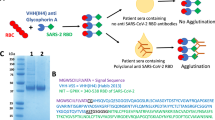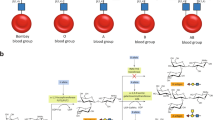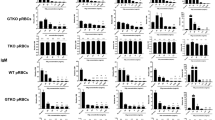Abstract
IN a recent communication in Nature, Basil-Jones, Sanger and Walsh1 described a case of puerperal pyæmia the red cells of which (Group O) were agglutinated at 20° C. but not at 37° C. by 45 out of 45 normal sera of all groups. The peculiar behaviour of these red cells appeared to be similar to that described by Levine and Katzin2 and Gaffney and Sachs3. The latter authors described their phenomenon as âpolyagglutinabilityâ of red cells.
This is a preview of subscription content, access via your institution
Access options
Subscribe to this journal
Receive 51 print issues and online access
$199.00 per year
only $3.90 per issue
Buy this article
- Purchase on Springer Link
- Instant access to full article PDF
Prices may be subject to local taxes which are calculated during checkout
Similar content being viewed by others
References
Basil-Jones, B., Sanger, R. A., and Walsh, R. J., Nature, 157, 802 (1946).
Levine, P., and Katzin, E. M., Proc. Soc. Exp. Biol. and Med., 39, 167 (1938).
Gaffney, J. C., and Sachs, H., J. Path. and Bact., 55, 489 (1943).
Friedenreich, V., "The Thomsen Hæmagglutination Phenomenon" (Copenhagen, 1930).
Author information
Authors and Affiliations
Rights and permissions
About this article
Cite this article
BOORMAN, K., LOUTIT, J. & STEABBEN, D. Poly-agglutinable Red Cells. Nature 158, 446–447 (1946). https://doi.org/10.1038/158446c0
Issue Date:
DOI: https://doi.org/10.1038/158446c0
Comments
By submitting a comment you agree to abide by our Terms and Community Guidelines. If you find something abusive or that does not comply with our terms or guidelines please flag it as inappropriate.



